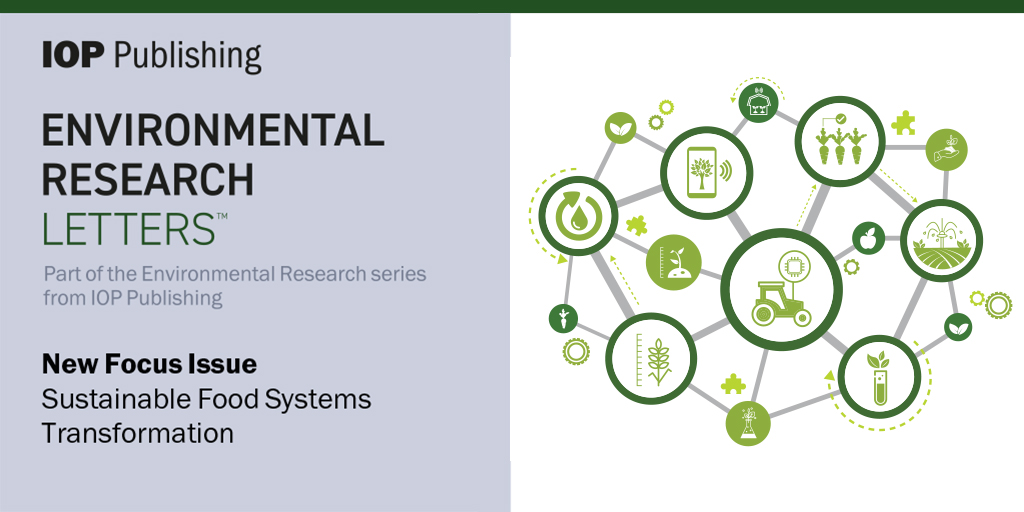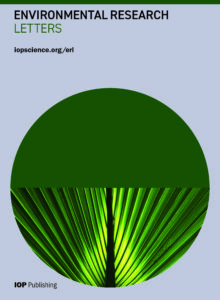ERL特刊征稿|Focus on Sustainable Food Systems Transformation

特刊详情
客座编辑
- Kyle F Davis,美国特拉华大学
- Carole Dalin,法国巴黎高等师范学院
- Shauna Downs,美国罗格斯大学
- Jessica Gephart,美国美利坚大学
- Matti Kummu,芬兰阿尔托大学
- Marta Tuninetti,意大利都灵理工大学
主题范围
Humanity faces the grand challenge of providing an affordable, safe, and nutritious food supply to a growing and more affluent population in a sustainable and resilient manner. This situation is made more complex by an increasingly globalized food system and its interactions with a changing climate as well as a triple burden of malnutrition, including undernutrition, overweight/obesity, and micronutrient deficiency. Agri-food system actors – including policy makers, corporations, farmers, traders, and consumers – must meet this challenge while considering potentially conflicting priorities, such as environmental sustainability (e.g., GHGs, water, land, nutrients, biodiversity), economic viability (e.g., farmer livelihoods, affordability), nutritional balance and quality (e.g., addressing overconsumption and undernourishment), social equity, and resilience to environmental extremes and other shocks. Understanding this growing complexity – which can involve global supply chains and difficult environmental and societal tradeoffs – will be essential for achieving sustainable and resilient agri-food systems. Given the extensive effects of food systems on people and the planet, identifying feasible solutions to transform current food system practices offers promise for realizing widespread socio-environmental benefits and for achieving multiple UN Sustainable Development Goals.
In this focus issue, we welcome research from all aspects (e.g., food supply chains, food environments, social/cultural factors) and dimensions (e.g., rural livelihoods, human health and nutrition, trade, natural resource use, climate change) of sustainable food systems, with a focus on identifying and testing solutions to transform food systems. This scope includes studies employing quantitative, qualitative, and mixed-methods approaches to assess a range of outcomes from agri-food system solutions across multiple spatial and temporal scales, and the trade-offs or synergies that may emerge between them.
Specific topics of interest include, but are not limited to:
- Novel food system innovations and their trade-offs or synergies between or within environmental, economic, health, and/or social outcomes of food system transformations
- Human health outcomes from food production practices (e.g., extreme heat exposure, air quality) and from shifts in food availability, affordability, quality (including safety), and access (e.g., malnutrition)
- Trade-offs and synergies between dimensions of resilience and sustainability
- Implications of transformations for food system components beyond food supply chains (i.e., food environments, individual factors, food security, and diets)
投稿流程
特刊文章与ERL期刊常规文章遵循相同的审稿流程和内容标准,并采用同样的投稿模式。
有关准备文章及投稿的详细信息,可以参阅IOPscience页面的作者指南。
作者可登入期刊主页进行在线投稿,在“文章类型”中选择“特刊文章”,并在“选择特刊”的下拉框中选择“Focus on Sustainable Food Systems Transformation”。
投稿截止日期:2023年11月15日。
期刊介绍

- 2021年影响因子:6.947 Citescore: 9.4
- Environmental Research Letters(ERL)以金色开放获取模式出版,作者可选择将原始数据作为补充资料与文章一起发表。所有研究人员可以免费获取这些研究成果。ERL汇聚了关注环境变化及其应对的研究团体和政策制定团体的意见,涵盖了环境科学的所有方面,出版研究快报、综述文章、观点和社论。ERL顺应了环境科学的跨学科发表的趋势,反映了该领域相关的方法、工具和评估战略,得到了来自不同领域的广泛贡献。
